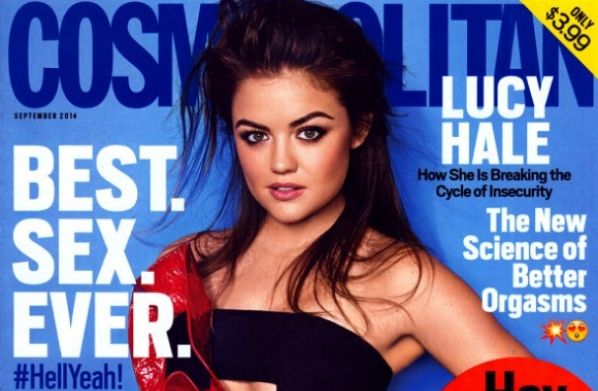From the wardrobe to the bedroom, Cosmo is known for offering women advice about the most intimate aspects of their lives. But the magazine has found a new aspect of women’s lives they’d like to shape—their decisions in the voting booth.
Cosmopolitan magazine, yes, the magazine with headlines such as, “It’s Sex O’Clock! The Time He Wants You Most,” “7 Days to Gorgeous Skin,” and “Best. Sex. Ever. #HellYeah!” (all from the September 2014 issue), announced yesterday that it will be endorsing candidates for the first time on record. Politico, which broke the story, concludes that, “The Cosmo endorsement criteria fall squarely into the liberal camp—equal pay, pro-choice, pro-birth control coverage, anti-restrictive voter-ID laws.” Cosmopolitan magazine Editor-in-Chief Joanna Coles doesn’t hide her agenda:
“People keep saying, ‘Oh, you’ve made the magazine much more political,’ but I feel that these are about lifestyle issues for women. The biggest single decision which will impact your life is when you have a child. I want women to have control over that, not a bunch of old white guys sitting in D.C. That to me is why I am doing this.”
Women, don’t be fooled by Cosmo. Women should be wary about ceding their political decisions to Cosmo and other purported “women’s magazines.” It’s fine to trust their advice on your nail polish color, your bathing suit style, and maybe even your perfume scent, but are you going to let them choose your political candidate? And let them influence policy and in turn, your opportunities?
Take the equal pay issue, for example. The real issue isn’t equal pay. Across the political spectrum, liberals and conservatives alike agree men and women should be paid equally, and there are already laws in place that make sex-based wage discrimination a crime. The issue is whether women buy into the debunked claim that women make just 77 cents for each dollar that men make. Even feminist Hanna Rosin has criticized using the number this way, as it doesn’t account for a number of choices. Big government supporters push this misinterpreted figure in an effort to add more regulations and restrictions on workplace freedom. Maybe that is too complicated for a magazine that is used to writing stories about the best sex moves.
But if you aren’t with them on “equal pay,” you won’t get their endorsement.
Or if you are pro-life? Forget about an endorsement from Cosmo. This ignores data like the May Gallup poll finding that 46 percent of U.S. adults and 41 percent of women are pro-life.
In addition to endorsements of Senate, House, and governor candidates, as part of its #CosmoVotes campaign, the magazine will feature stories written by feminist Jill Filipovic and roll out a social media effort to encourage women to vote.
Don’t expect unbiased, nuanced reporting and don’t expect Cosmo to simply convey the facts and let the readers decide which candidate is best for them. Filipovic’s first article for the Cosmo website headlined, “How the GOP’s Block of the Minimum Wage Bill Hurts Women,” included this gem: “The Republican Party serves two distinct but sometimes overlapping factions: Big corporate interests and social conservatives.”
The “Save the Date” card to kick off the social media effort reads more like an invitation to a fraternity party than a political discussion. It features a picture of Beyoncé sporting red, white, and blue finger nails and the caption, “If you liked it then you shoulda put a vote on it.” Obviously, Cosmo is trying to make political participation “feel like a party.”
Oh good, a college frat party illustrates just the serious and sober-minded attitude Cosmo suggests we take toward national elections.
Don’t worry ladies, it won’t be too complicated. Amy Odell, Cosmopolitan.com’s editor, said she’s going to make sure the election is not “boring and difficult to understand.”
But that’s the problem. Is relying on empty slogans and one-sided reporting empowering? Or is it more empowering to actually understand the different positions of the candidates and think independently?
And isn’t it ironic? Cosmo—a magazine that routinely reduces women to sexual objects that exist solely for men’s pleasure—is attempting to establish itself as an authority on women’s political empowerment. Surely women can see through this.
Rather than addressing political issues with the seriousness they deserve, it looks like Cosmo is going to mislead women with biased, one-sided reporting and – oh yeah – a cool party approach. Women accustomed to trusting Cosmo’s influence over their wardrobe and accessory decisions should be cautious about the magazine’s influence on their (much more consequential) political decisions.
Karin Agness is a senior fellow at the Independent Women's Forum and founder and president of the Network of enlightened Women.


